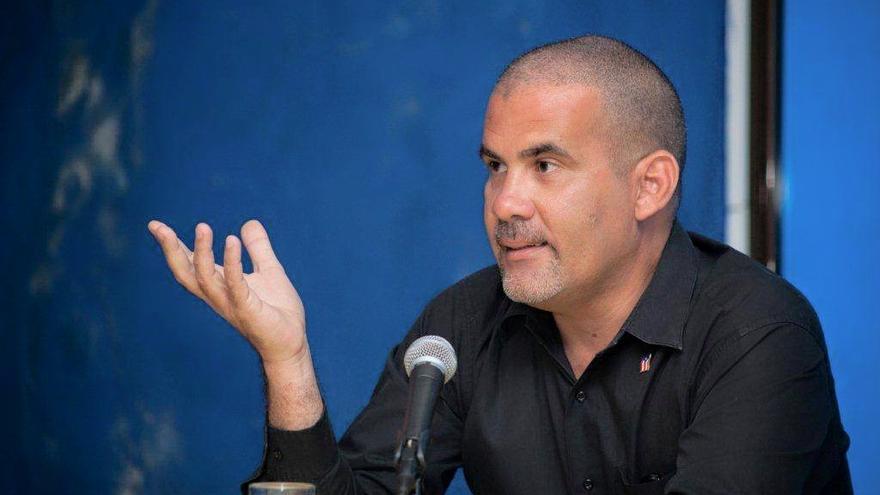
![]() 14ymedio, Havana, 3 October 2019 — Scandal is once again shaking Cuban universities. This Tuesday, the University of the East defended the expulsion of a professor for publishing texts of an “ambiguous” character. René Fidel González García was removed from his position three years ago and recently received a sanction that prevents him from working in any other center of higher education on the Island.
14ymedio, Havana, 3 October 2019 — Scandal is once again shaking Cuban universities. This Tuesday, the University of the East defended the expulsion of a professor for publishing texts of an “ambiguous” character. René Fidel González García was removed from his position three years ago and recently received a sanction that prevents him from working in any other center of higher education on the Island.
At the center of the controversy for similar previous cases and a turn of the screw in the ideological discourse in schools, the text exposes that since 2012, González’s publications on digital sites like La Joven Cuba, Rebelión, Sin Permiso, and Cuba Posible “were radicalizing to the point where they became the most controversial, contradictory, and disrespectful.”
The declaration considers that starting with the revocation of his status as tenured lecturer and his university professorship he has created “a defamatory campaign” against his alma mater in the east, the “officials of the institution and the Ministry of Higher Education” who do not know “the true elements of the case.”
The declaration comes a few weeks after the publication of an open letter repudiating ideological censorship and discrimination for political reasons in Cuban universities. The document, dated in August, was signed by almost 4,000 educators and students demanding the end of this type of “punitive sanctions.”
Without alluding to the letter, the text signed by the Board of the University of the East insists that the academic’s publications were creating “confusion for readers about philosophical and political terms, because of the ambiguous and obscure character” they had.
Additionally, the document accuses González of causing students to “affiliate themselves to his positions out of confusion” and attributes to him a negative influence that, in their opinion, prove the focus of the final assignments turned in by students of the class Sociology of Democracy.
The Scientific Board of the University then agreed to exclude those texts or essays from the list of the “results” of González’s research work because they were published in scientific journals that are not registered on “databases of international prestige.”
For their part, “political organizations and organizations of the masses, in their debates and pronouncements, indignantly rejected the position of the educator, his negative impact on professional training and the prestige of a collective firmly committed to the Revolution, like the Faculty to which he belonged,” it adds.
González lost his tenure for committing “acts of moral or social nature” that damaged “his prestige,” specifies the text, which warns that the process was carried out “in strict compliance with the law.”
The professor has spent three years appealing the decision through official channels and demanding that he be returned to his position, from the Attorney General and the Ministry of Higher Education to the president of the Republic, but until now he has not received a response and he has now exceeded the statutory deadlines. His perseverance has found broad support on social media, where professors and students have stood in solidarity with González.
But in their text, the university authorities insist that the professor “maintains a constant will to denigrate and ridicule” the university authorities and the Ministry of Higher Education, which makes clear to the Board that “he didn’t have, nor will he have, the conditions to be a university professor.”
The text regrets the solidarity of certain persons who have heard “a version of the events unfortunately wrongly told and manipulated by René Fidel González García” and others attempting to cut down the institutionalism of the Cuban State and Government.
On September 16, the Minister of Higher Education, José Ramón Saborido Loidi, confirmed the Ministry’s stance by supporting an article by Martha del Carmen Mesa Valenciano affirming that the Cuban university has as its mission to form “before all else, revolutionary and committed professionals.” Additionally, he cited Article 5 of the Constitution, in which it is declared that the Communist Party of Cuba is the top leading political force of society and the Cuban State.
A few hours after the declaration was published, there were already various reactions of protest visible on social media. José Raúl Gallego, a professor of journalism expelled from the University of Camaguey and one of the signers of the open letter in August, described the text as “shameful,” but he also believes that it is “something symptomatic.”
“They can only take out a declaration in the name of the Board, while René is supported by his students, his friends. The abstract, the nameless, the institutional versus the concrete, the selfless.”
Translated by: Sheilagh Herrera
___________________
The 14ymedio team is committed to serious journalism that reflects the reality of deep Cuba. Thank you for joining us on this long road. We invite you to continue supporting us, but this time by becoming a member of 14ymedio. Together we can continue to transform journalism in Cuba.
